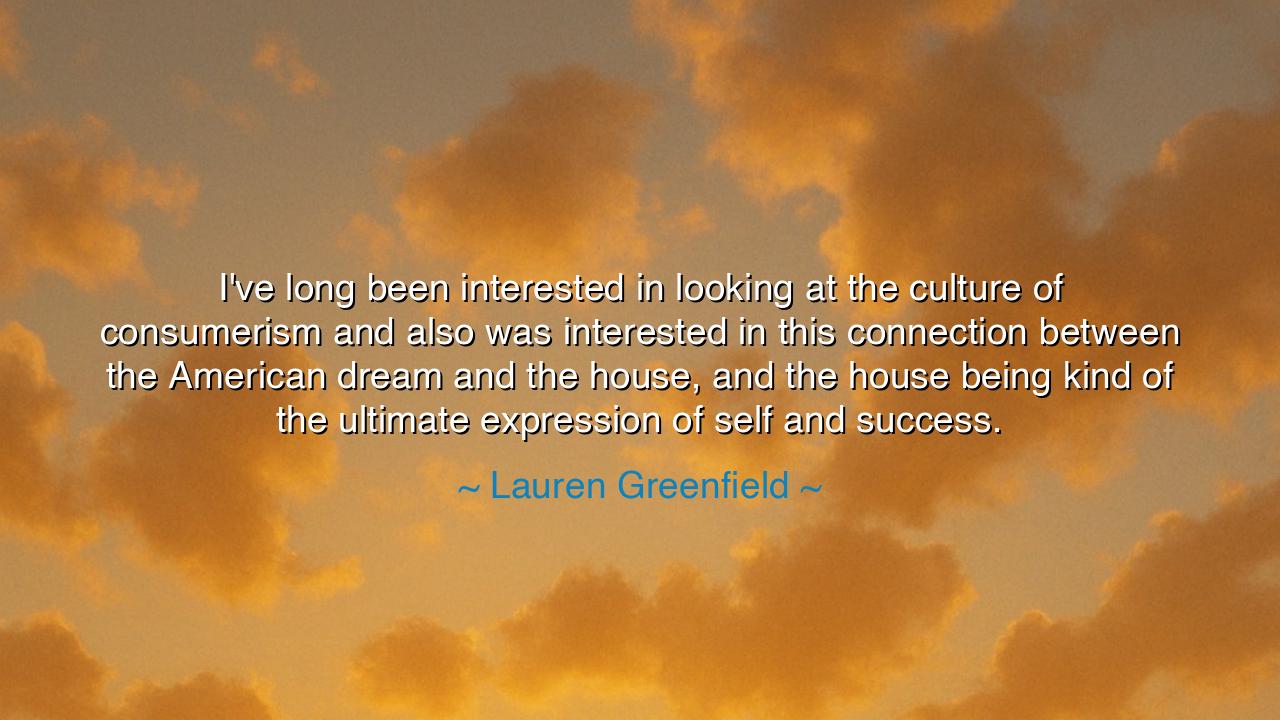
I've long been interested in looking at the culture of
I've long been interested in looking at the culture of consumerism and also was interested in this connection between the American dream and the house, and the house being kind of the ultimate expression of self and success.






Hear now the words of Lauren Greenfield, the keen observer of our age: “I’ve long been interested in looking at the culture of consumerism and also was interested in this connection between the American Dream and the house, and the house being kind of the ultimate expression of self and success.” These are not the musings of chance, but the voice of one who gazes into the heart of society and reveals its hidden idols. She speaks of a dream that has guided generations—a dream of prosperity, of security, of belonging—and how it has been bound, in the eyes of many, to the image of a grand dwelling, a house that stands as a monument to one’s life.
In the dawn of this dream, the house was not vanity. It was sanctuary. For immigrants crossing oceans and settlers moving across wilderness, a modest home was the proof of arrival, the symbol of survival and dignity. Four walls, a roof, a hearth: these were not luxuries but shields against hunger, cold, and despair. In such beginnings, the house embodied triumph over chaos. Yet as the years flowed, and the world of industry and consumption grew, the home ceased to be merely shelter. It became a stage for status, a mirror reflecting not who we are, but who we wish the world to believe us to be.
Recall the tale of the Great Depression. Families once proud of their homesteads watched their houses taken by banks, their dreams turned to ashes. Yet, in that crucible of loss, many discovered a deeper truth: the dream was never truly in the bricks and mortar, but in the community, the bonds of kin, the shared meals, and the endurance of the human spirit. Some rebuilt smaller, humbler homes, yet carried within them a greatness that no mansion could equal. Here we see clearly that the American Dream, at its heart, was not meant to be the pursuit of endless possessions, but the pursuit of dignity, security, and belonging.
Lauren Greenfield, with her lens and her words, warns us: beware when the house becomes more idol than haven, more symbol than shelter. For in the endless race of consumerism, where one house must be larger than the last, the heart grows restless, never satisfied. A palace may rise on the outside, yet emptiness may echo within its walls. To equate self and success with material display is to build upon sand; when storms come, the foundation crumbles. True self cannot be bought, and true success cannot be measured in square footage.
Consider also the parable of the emperor who built a palace of gold, vast and glittering. He invited all to admire its beauty, yet he himself wandered its halls alone, consumed by suspicion and fear. His people whispered that he was the poorest man alive, for though he possessed riches, he lacked peace. Compare this with the farmer whose cottage was small, but whose doors were open, whose hearth was warm, and whose laughter filled the air. Which, then, was the greater house? Which was the truer reflection of success?
Thus, children of the present age, take this teaching to heart: do not let the culture of consumerism steal your soul. The home you build, whether palace or hut, is but a vessel. What matters is what dwells within—the love you nurture, the character you forge, the spirit you share. Let your measure of self be not in what you display, but in what you give. Let your measure of success be not in ownership, but in impact.
Practical wisdom follows: cultivate gratitude for the shelter you have, however simple. Invest not only in walls and roofs, but in relationships, in learning, in acts of kindness. Before chasing after the larger house, ask yourself: will this bring deeper joy, or only heavier chains? When you walk into your dwelling, let it not be a monument to vanity, but a sanctuary for truth.
So let the words of Lauren Greenfield stand as both mirror and torch. She reveals the illusions that ensnare, but also guides us to higher vision. The American Dream is not dead, but it must be remembered in its pure form—not as endless grasping, but as a life of dignity, belonging, and authenticity. Build your house, yes—but more than that, build your soul. For in the end, it is the soul’s foundation that endures when all else fades.






AAdministratorAdministrator
Welcome, honored guests. Please leave a comment, we will respond soon